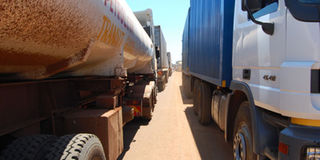URA tightens grip on cross border revenue leakages

Trucks approach Malaba border, enroute to Kampala. FILE PHOTO
Kampala- Uganda Revenue Authority has upped its game on transfer pricing as it moves to close all tax revenue leakages to meet its tight revenue target.
A source close to the matter told the Daily Monitor that URA is concerned about multinational corporations that have subsidiaries in Uganda and transfer monies earned from the local market to their parent companies without paying the necessary taxes that might have accrued from inter-company transactions.
“After collecting related party disclosure forms where tax payers provided information about transfer pricing transactions for the last four years, URA is now asking taxpayers to furnish it with their transfer pricing policies and documentation,” a source said.
Transfer pricing refers to the terms and conditions surrounding transactions of companies with associated enterprises operating in different countries, where such companies are required to document and stipulate clearly prices charged for their inter-company transactions the exact way it would have been set between independent parties acting in the ordinary course of business.
“URA is asking companies with related-party transactions – including domestic related-party transactions in excess of Shs500 million or approximately $ 190,000, to have in place documentation supporting the arm’s length pricing,” the source said.
The policy and documentation is expected to illustrate the methods used for pricing the related party transactions and also demonstrate that those prices conform to the “arm’s length” principal – stating the right transaction costs to facilitate genuine taxation.
URA’s revenue collection target was raised to Shs8.5 trillion for the 2013/14 financial year, from Shs7.2trillion the previous financial year.
URA confirmed to have sent out the letters, saying it wants to ensure that no revenue is lost due to transfer mispricing, according to Mr Paul Kyeyune, the URA ?manager of public and corporate affairs.
“It’s true that we have asked some selected companies [those in our audit plan this year] to avail us their transfer pricing policies and documentation on how they arrived at the transfer price but we did not request this from every tax payer but rather from those we can handle at a time,” he said in an e-mail exchange yesterday.
He added that after they have handled the first group, they will request the same from others.
Although URA declined to reveal the names of the affected taxpayers citing the taxpayer confidentiality right, a source said that most companies with associated parties have been asked to avail such information.
Mr Kyeyune said asking for policies and documentation seeks to enable URA to assess how taxpayers with cross-border transactions between associated parties may have arrived at the transfer price, the methods used and comparability factors that were put into consideration when arriving at the price. All this is done through audits.
He, however, did not rule out the desire to explore all the possible avenues to collect to the Shs8.5 trillion in revenue from anywhere it might be hidden to meet the revenue collection target.
Going forward, he added, companies will be required to disclose cross-border transactions between associated enterprises as part of the tax returns submitted annually.
Transfer pricing was not a significant




